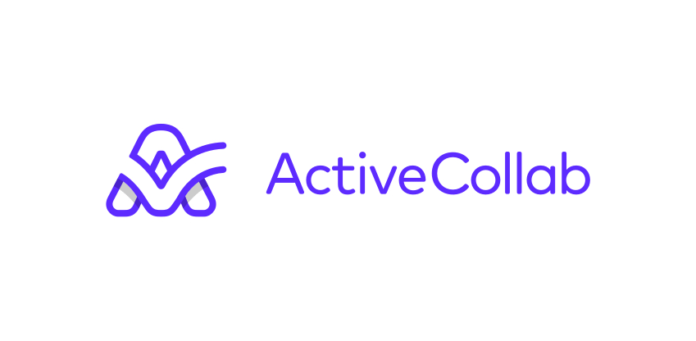Looking for ActiveCollab alternatives? This post will show you 10 best ActiveCollab alternatives that you never knew before. A project management and collaboration application called ActiveCollab is notably well-liked by advertising companies and creative teams. This can be a terrific option if you’re seeking for a platform to organize and collaborate with your clients’ communications.
10 Top ActiveCollab Substitutes to Organize Projects Effectively
ActiveCollab, however, lacks some essential functions for managing your complete organization. Particularly important are intake forms, customer onboarding, and a strong billing and invoicing system.
We shall examine the alternatives to ActiveCollab in this article. We will make every effort to be as unbiased as we can and provide you with all the information you require in order to make your decision, even though we also run our own project management software for agencies where you may handle client interactions.
Describe ActiveCollab
A project management application that allows you total control over your work, according to ActiveCollab. In essence, the application aids in the organization of your team around a single point of truth where clients, projects, and communications can all be managed. Additionally, it contains capabilities like calendar, file sharing, automations, estimates, and time monitoring.
The Plus plan’s starting price is $9 (for a maximum of 3 members), while the Pro plan’s starting price is $7 per member. Unlimited clients are included in all plans. The Pro package includes online payments, tracking capabilities, integrations, and extra storage (100GB with the option to purchase more). You will probably require the Pro plan if you own an agency or even a freelance business and need to pay clients or keep track of your time.
A free subscription with a maximum of 3 users is also available, which is excellent if you’re just getting started or utilizing the product exclusively internally. Now let’s examine a few helpful attributes of ActiveCollab:
Important characteristics:
• Tasks and initiatives (with Kanban view)
• Time reporting and time tracking
• Expense reporting
• Billing (and recurring invoices)
## Planning for holidays and time off
Budgeting for projects
• Adaptations (Zapier, Slack, Webhooks)
Overall, it has all the tools you require to direct and schedule the work of your team and interact with your customers.
Pros:
• With Gantt and Kanban views, Task dependencies, Activity log, and more, the project management function is exceptionally feature-rich.
• Zapier allows you to connect ActiveCollab to other applications you use.
• It’s free for the first three clients and typically reasonably priced.
Cons:
• There is no feature for customer onboarding.
• No intake forms are present.
• The billing process is quite simple.
1. Asana
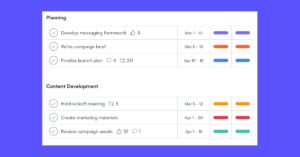
One of the most popular project management solutions on the market is Asana. It has timeframes (you may use a Gantt chart to show the progress of your projects), Kanban boards, Dashboards, Automations, and more. Looking for accounting softwares? Check this article on Intacct Alternatives.
Asana’s powerful project management tool is its greatest asset. The Premium plan is priced at $10.99 per month, and the Business plan is priced at $24.99 per month. Additionally, it offers a generous free plan that allows for up to 15 colleagues.
Pros:
• Asana offers a variety of ready-to-use templates that can be used to get ideas for managing your team or project.
• The complimentary plan is very generous. It will be adequate for your team if you only need to manage projects and don’t need automations, reporting, or dashboards.
Cons:
The greatest drawback is the per-user pricing. This might get extremely expensive if you have a lot of clients.
It primarily serves as a project management tool. Important services like invoicing, billing, and customer onboarding are absent.
• Asana is primarily a platform for managing internal projects and isn’t truly client-facing.
2. Basecamp
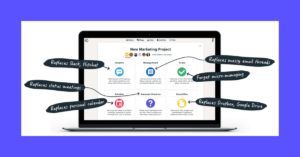
Another excellent choice for project management and client communication is Basecamp. Basecamp’s user-friendly interface, which also allows it to replace many other apps, is what makes it special (Slack, Google Drive, Calendar, Email threads). Its features include shared schedules, automatic check-ins (great for reminding your team to complete duties like reports), project management with tasks, and internal communication.
Pricing for Basecamp business, which offers 500GB of storage space, 500GB of users, and limitless projects, starts at $99 per month. Additionally, Basecamp offers a free plan with a 3 project, 20 user, and 1GB storage space cap.
Pros:
• The user interface is very user-friendly.
• The feature for internal communication is also quite helpful in replacing Slack.
• It has Mac and Windows apps in addition to iOS and Android ones.
Cons:
• It lacks functions that agencies could find useful, such as billing, invoicing, or forms.
• Although you can add your clients to it, unlike Asana, it is not actually client facing.
3. ProofHub

Another helpful tool for managing projects and communicating with clients is ProofHub. It has projects (with many perspectives, including Kanban and Gantt), discussions (excellent for avoiding lengthy email threads), a calendar, file sharing, chat, as well as Collaboration and ProofHub’s user-friendly interface, which doesn’t require a high learning curve, are its two major advantages. However, it is missing some essential components, including forms, billing, and invoicing. Pricing for up to 15 projects and unlimited users begins at $45 per month.
Pros:
• The setup process is simple, and the user interface is very intuitive.
• It offers a tool for proofing that is particularly useful for managing creative teams.
Cons:
• It lacks some functionality, including billing and invoicing, that you might require to run an agency.
4. Trello

A well-liked straightforward project management tool is Trello. It’s a terrific option if you’re looking for a straightforward, simple-to-use solution for your clientele. Kanban board project management software is called Trello. Its features include automations, checklists, and deadlines.
Trello’s greatest asset is how easy it is to use. The cost of paid plans starts at $10/month (billed annually) and $12.5/month (billed monthly), respectively. There is a free plan available.
Pros:
• Very user-friendly
• It offers a copious free plan.
Cons:
• Managing numerous tasks could become overwhelming if you receive a lot of them (cards).
• You must make a unique board for each client. As you scale, juggling multiple boards could become challenging.
5. SupportBee
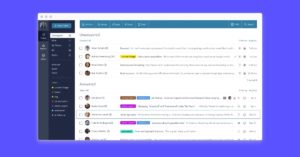
Another intriguing alternative that focuses on ticketing and customer assistance is SupportBee. It might be a fantastic solution to take into consideration if you require your consumers to submit ticket requests and you want a tool that accomplishes exactly that.
A customer portal, ticketing software, and knowledge base program are among SupportBee’s services. SupportBee focuses on teamwork and customer assistance.
Pros:
• The booking process is quite reliable.
• Slack and other applications like Pipedrive, Asana, and Basecamp have integrations.
• An API is also available, allowing you to completely customize your workflow.
Cons:
• A mobile app does not exist.
• There is no CRM, billing, or invoicing.
6. Huddle
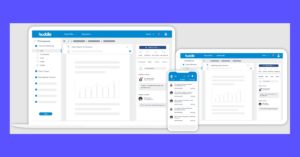
Document and file collaboration software called Huddle. Its features include task management, file sharing, document collaboration, file requests, and file requests. Huddle is an excellent option if you share a lot of files and work with your clients on them.
Pricing for Huddle is accessible if you schedule a demo call with them. The fact that Huddle’s pricing starts at 25 users, which is unsuitable for small businesses, is its major drawback.
Pros:
• The document collaboration capability is particularly feature-rich and offers collaboration, file requests, and document versioning.
• A safe system for sharing files exists.
Cons:
• Huddle doesn’t prioritize small businesses. Plans for a minimum of 25 users (Plus plan) and 100 users are available (Premier plan)
• There is no free trial; to get started, you must request a demo.
• For managing a service firm, certain functions are lacking, such as invoicing, billing, or CRM.
7. Teamwork

An approach to project management called teamwork concentrates on client work. Tasks, a calendar, messaging, files and versioning, internal dashboards, time monitoring, and automations are some of its features.
In addition, they feature add-ons including a knowledge base, team chat, support desk, and CRM. Teamwork is an extremely thorough collaboration solution for managing client projects overall. Recurring billing is the only thing that is absent. But there is a fundamental invoicing function.
There is a free plan with basic project management, messaging, and milestones, and pricing starts at $10/month invoiced monthly ($12.5/month if billed monthly).
Pros:
• The user interface is very simple to use.
• The add-ons, such the knowledge base and help desk, make it simple to provide customer support.
Cons:
• No client portal exists (however you can brand Teamwork)
The billing system has extremely few features.
• Because pricing is determined per user, charges may increase if you have many customers.
8. SuiteDash

An all-in-one client portal program is SuiteDash. Check out our SuiteDash review for more information. It includes file management, projects, contracts, scheduling, forms, a CRM, and a client portal. SuiteDash provides a ton of functionality, but the learning curve can be challenging. Pricing for SuiteDash begins at $19/month, and a 14-day trial period offers you full access to all features. Check this article on Insightly alternatives.
Pros:
• It offers every feature you require. Projects, automations, integrations, recurring billing, proposals, and invoicing.
• You can configure sophisticated workflows.
• It provides sophisticated customisation options.
• It offers a mobile app that you may use to run your business while you’re on the road.
Cons:
• The UI/UX occasionally appears cluttered and dated.
• The sheer number of features might be overwhelming, especially if your business is just getting off the ground.
• The software’s learning curve might be steep as well.
9. Airtable
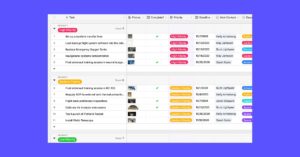
Another excellent option for working with your clients is Airtable. It has automations and is essentially a better alternative to Excel or Google Spreadsheets. To inform your clients of the progress of their tasks or projects, you can generate sheets and share them with them.
Kanban boards, a grid, forms, a calendar, and a gantt view are among the features. Additionally, there are numerous customization options. Airtable is an excellent option if you want a quick way to inform clients of the progress of their projects or give them reports. Check this article on Engagebay alternatives.
Pricing for Airtable starts at $10/month per seat for the Plus plan, or $12/month if paid monthly, and $20/month per seat for the Pro plan. More records, up to 20GB of attachments per base, and sophisticated features like personal and locked views, field and table editing permissions, are all included in the Pro plan.
Additionally, a free plan is available, with each base allowing for up to 1200 records and 2GB of attachments.
Pros:
• Airtable offers complete customization.
• A mobile app exists so you can run your company while on the go.
• You may use Airtable with your current tools or perform automations with it.
Cons:
• If you have a large user base, pricing may be prohibitively high.
• If you only use Airtable to run your company, things may become unorganized if you have a large number of users.
10. ManyRequests
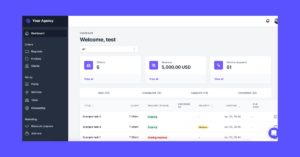
Our program, ManyRequests, is a client platform for businesses who provide services to other businesses. More than 1000 agencies make use of it. It includes a team management system, order forms, invoicing, automations, project and task management, onboarding, and a white label client site.
It works best for organizations that want everything in one location. Pricing ranges from $59 per month for two team tickets to $249 per month (for unlimited team seats)
Pros:
• You can get started using it right away because it is really simple to use.
• It includes all the capabilities required to operate a contemporary agency, including the ability to receive payments, onboard clients, send notifications, and use a powerful project management tool.
Cons:
No mobile app (yet)
• There are no further significant drawbacks

